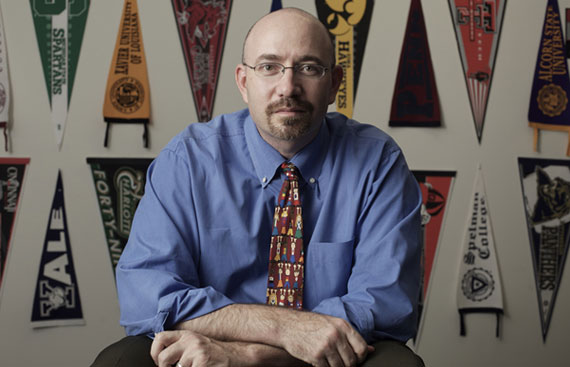Mike Feinberg Is Breaking the School-to-Prison Pipeline - with Power Tools

In a converted juvenile detention facility on Houston’s south side, the scent of hot wings drifts down a hallway that once echoed with the clank of cell doors. At La Bodega, a small student-run snack bar tucked inside the building, 19-year-old Hudson Risch counts the week’s earnings—about $600—before his shift ends. Two years ago, Risch’s future seemed tethered to the criminal justice system. Now, with a GED in hand, a food-handling certification, and a full-time job with benefits, he’s mapping out a different kind of adulthood.
This turnaround is the daily work of the Opportunity Center, a vocational and academic program for youth entangled in the juvenile justice system. Since opening in 2022, it has produced results that defy expectations: a 93 percent daily attendance rate and recidivism nearly halved, from Harris County’s 48 percent baseline to 28 percent among participants. Students don’t just show up — they stay, graduate, and find work.
A Teacher and a Student Reunite
The seeds of the program were planted decades ago in a fifth-grade classroom. Mike Feinberg — then at the very start of his career, co-founding what would become the KIPP charter school network—was Vanessa Ramirez’s teacher. She remembers him with a grin: “He had hair back then.” Feinberg helped her secure a private high school scholarship and guided her through college, where she studied economics at Occidental.
Years later, Ramirez’s work brought her into juvenile detention centers, where she began to notice a chilling pattern. “I was seeing kids from my block—not just my neighborhood, my actual street,” she says. “It begs the question, ‘Why me?’ How was I redirected? People make all the difference.”
Determined to be that difference for others, Ramirez launched 8 Million Stories, a nonprofit focused on juvenile justice reform. When Feinberg co-founded WorkTexas in 2020 with Houston furniture magnate Jim “Mattress Mack” McIngvale, he invited Ramirez to join as a partner. Together, they pitched Harris County officials on a simple but radical premise: that three letters more powerful than G-E-D could keep kids out of prison — J-O-B.
The county agreed, transforming its Burnett-Bayland facility into the Opportunity Center. Enrollment expanded from a handful of students to roughly 65. WorkTexas provides the vocational instructors; Harris County’s juvenile probation department covers about 75 percent of the budget, with the remainder coming from grants and private donors.
Turning Discipline into Development
Inside the Opportunity Center, suspension doesn’t mean sitting in a silent room staring at a wall — it means building the wall. Students split their day between GED preparation and hands-on vocational training in carpentry, welding, HVAC, plumbing, electrical work, music production, and entrepreneurship. Each spends a week sampling every discipline before choosing a focus for five weeks of intensive training.
Traditional school discipline, Ramirez argues, too often sidelines rather than rehabilitates. “Kids don’t know how to de-escalate,” she says. “Instead of helping them understand what they did and why, we stick them in a classroom facing a wall. We’re not developing self-awareness or communication skills.”
The Opportunity Center takes the opposite tack. Its behavioral health program includes a sensory room where students identify personal calming tools—kinetic sand for one, a conversation about authority dynamics for another. Lessons in emotional regulation are woven into the day alongside instruction in welding technique or electrical safety.
Music producer Randy Jefferson runs the Project Mixtape Studio, nudging students toward “nonviolent, peaceful songs with a PG vibe.” His goals extend beyond the music charts. “If I influence them to be a better person, that’s what I’m trying to do,” he says.
Crucially, enrollment is voluntary. Students referred by probation officers after a judge orders them back to school or into GED coursework can choose the Opportunity Center. That choice, Ramirez says, builds accountability from the start: “It’s baked into the model.”
From Street Corner to Steady Paycheck
Risch’s story captures the program’s impact. At 17, he was staring down adulthood with no diploma, no marketable skills, and few options beyond low-wage work. The Opportunity Center gave him structure, mentorship, and a trade. After earning his GED and certification, he completed a 240-hour paid internship at La Bodega, mastering not only food preparation but also inventory control, customer service, and bookkeeping. Today, he manages the operation full-time, proudly reporting that hot chips and wings are still the bestsellers.
But food service is just one pathway. Graduates leave ready to be chefs in restaurants, repair cars, produce music tracks, or start their own businesses. They step into jobs with living wages, reducing the gravitational pull back toward the streets.
A Hub, Not a Silo
Feinberg calls the Opportunity Center a “social services mall” anchored by education. More than 30 partner organizations operate under its roof. Journey Through Life offers mental health counseling. Clothed by Faith provides wardrobe essentials. The Houston Food Bank keeps the pantry stocked. Each partner brings its own funding and expertise, making the model both comprehensive and sustainable.
“Schools don’t have to do it all,” Feinberg says, “but schools can be the hub — because schools are where kids spend most of their waking hours.”
In Houston, that hub hums with the sounds of hammers, saws, and even the occasional freestyle in the music studio. For students like Hudson Risch, it’s more than a school; it’s proof that the pipeline to prison can be dismantled and rebuilt into something far sturdier—one job, one skill, one young life at a time.
